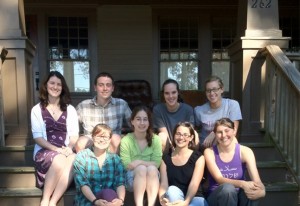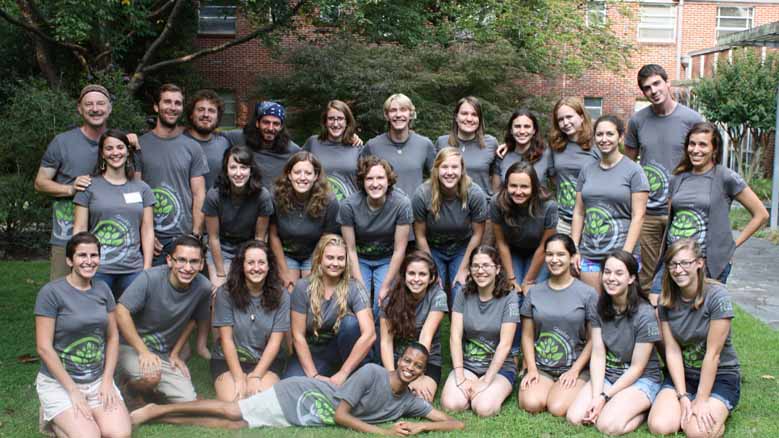 What made you want to start Quaker Voluntary Service?
What made you want to start Quaker Voluntary Service?
I’ve been carrying the leading and the idea for QVS for 10 years, but not necessarily in concrete form. When I graduated from college in 2002, I was looking for some kind of opportunity like this. I was fired up about social justice and Quakerism. As a religious studies major, I wanted to explore my spirituality and my faith as well as live in community, but I couldn’t find anything like this for young adult Quakers. When I would talk to Friends my parents’ generation or older, they’d talk about Quaker service work camps like they were the most important experience of their lives. They said those transformative and powerful experiences were the reason people became Quakers or remained Quakers. While I found great non-Quaker service organizations, nothing compared with those stories. So I began to learn more about other programs. I have good friends who are Mennonites and learned about Mennonite Voluntary Services as an option. This is what many young Mennonites did out of college, and it set them on a path for the rest of their lives. I kept wondering what had happened to these opportunities for Quakers and also wondered why feeling the power of really prophetic service and social justice witness seemed to have become disconnected from our faith community.
My vision of QVS was based on the idea that our service, justice and activism in the world is deeply grounded in our faith and faith communities, and that when these two aspects are paired, each are stronger.
Do you think part of the problem is that young adult Friends have trouble gaining recognition in the Religious Society of Friends? That their messages and ministries have often been discounted?
Well, it’s hard to classify what it means to be a “young Friend.” 40 or younger may safely be in the young adult category for Quakers.
When I was a young adult just out of college, I did not feel always as welcomed as I hoped to be. My leadership or my peers’ leadership wasn’t always embraced or lifted up. That’s why part of my leading for QVS was to create opportunities for young adults. There’s this nebulous period for adults after college, and I don’t think there are as many opportunities to engage in service that is at a deeper level than the kind we often do in high school or college.
In the last ten years, some things have changed in our faith community. Aside from QVS, young friends are stepping into leadership positions in ways I haven’t seen before: for example, Noah Baker Merrill, who is a QVS board member, has just been named the new General Secretary of New England Yearly Meeting; Gabe Ehri is the executive director of Friends Journal; and Barry Crossno is the new general secretary of Friends General Conference. Though it still may be hard for people even younger, in their twenties, there are young adult Friends conferences, new web initiatives, and an exciting energy among young adult Friends.
What are some things young adults can do to expand their recognition?
It’s important for meetings to empower young adults, but it’s also important for young adults to come to meeting and contribute and find ways to make the Society their own. One of the things we found when I served on the Youth Ministries Committee of Friends General Conference as we did workshops in meetings about engaging people intergenerationally, is that everyone, at any age, wants to feel more welcome and more fully known. We have to find ways to engage all generations of Friends in our community.
Why choose Atlanta for your pilot service house? What is unique to that location?
Atlanta is a city with one of the greatest disparities between rich and poor. Every place in the world has great need, but we identified Atlanta as a city where are particularly interesting opportunities for justice and service work. Also, Atlanta Meeting, who has taken the first QVS project under their spiritual care, was founded during the civil rights movement around these issues of justice and civil rights, and their partnership has been crucial to getting this off the ground.
When the QVS board came to Atlanta in fall of 2011, we met with a lot of people from the Atlanta Meeting both individually and in groups and got a clear sense that there was energy and excitement about our program. A lot of people at Atlanta Meeting are doing great justice work, but there hasn’t been a project of the meeting as a whole for a long time. We went through the official discernment process, and the meeting was clear to take the Atlanta project under their spiritual care. Atlanta meeting decided to have corporate responsibility for QVS. In working on QVS together, we now again have a project that many people can be a part of and contribute to in a variety of ways. We needed that spiritual support and logistical support, people who would be willing to chip in and help us get off the ground.
Were the organizations receptive to what you wanted to do as part of QVS?
Yes. Since we’re working with a number of faith-based organizations, they are familiar with our model through their work with organizations like the Jesuit Volunteer Corps and Mennonite Voluntary Service. Most organizations we’re working with this year in Atlanta are through personal relationships I had, and Quakers generally have a good reputation. People were willing to partner with us as Quakers even though we were a brand-new start-up, and that really helped.
What are some of the places your volunteers are working? How were these organizations chosen as part of QVS?
Our volunteers are in a wide variety of organizations that address issues that are important to friends of Atlanta Meeting. One example is the local American Friends Service Committee office, helping to develop programs in public schools around conflict resolution. Another is the Frazer Center, a center for children and adults with developmental disabilities. We have two volunteers at the Clarkson Development Foundation in a small town east of Atlanta that has become a hub of resettlement for refugees from all over the world. It’s a foundation that works from an asset based community model to help immigrants and refugees by starting a health clinic, implementing a community supported agricultural farm, and providing a system of childcare and education. We also have a volunteer at Habitat for Humanity Atlanta in the Family Services division who helps families access the resources that Habitat has to offer.
What are future plans for QVS?
QVS is in active organizing to start our second houses of service in Philadelphia (Pa.) and Portland (Oreg.) next summer. We are excited about expanding our network and gaining the kind of scale that will come from multiple locations. As we expand, we will have the capacity to accept more volunteers and work in a wider range of organizations, plus streamlining and sharing things like orientation, curriculum and resource development, retreats and trainings. We will also be recruiting for our 2013-2014 class very soon. Applications will be due in March 2013.
Thanks for talking with us, Christina!
Bottom blurb:
For more information on Quaker Voluntary Service, please see www.quakervoluntaryservice.org or contact Christina at Christina@quakervoluntaryservice.org.




I am delighted to read about this grass-roots service organization. I have long felt sad that Quakers no longer had opportunities for direct Quaker service similar to what was once available through AFSC.
I wish you all the success in the world.